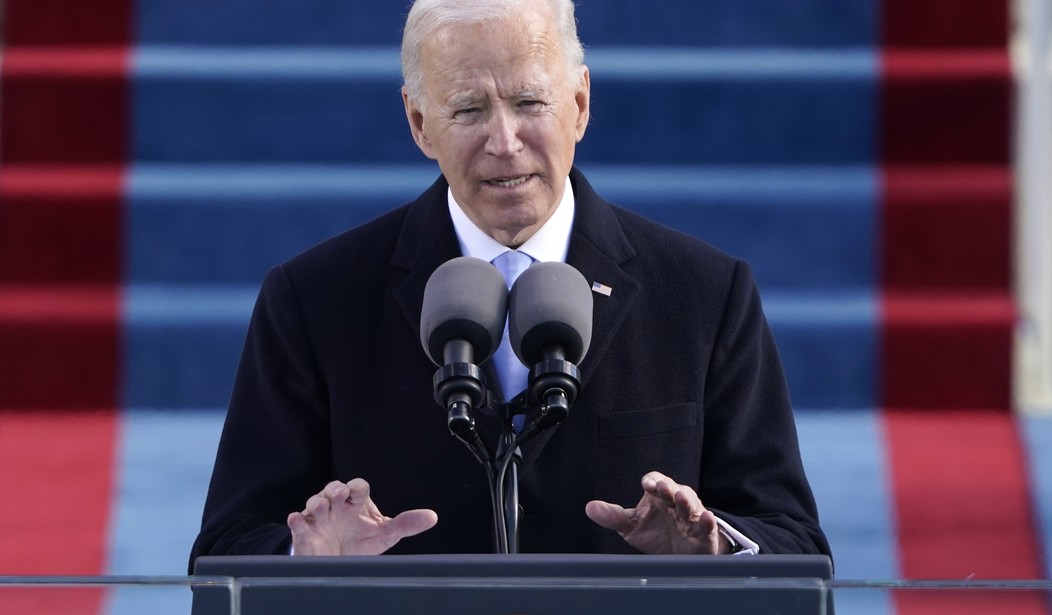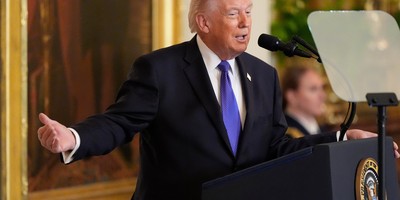"We must end this uncivil war," Joe Biden proclaimed shortly after he became the 46th president on Wednesday. Hours earlier, in his last moments as the 45th president, Donald Trump extended "best wishes" to the "new administration." Graceful words, but accompanied by sharp and, in some cases, deserved attacks. Our presidents since George Washington have come to office through an inevitably adversary process, and while they may inspire "unity" on occasion, that's more the exception than the rule.
That process has become especially adversary in times of close division, like the polarized partisan parity prevailing since the 1990s. Joe Biden is the fifth consecutive president taking office with his party holding majorities in both houses of Congress. But those majorities proved evanescent for both his two Democratic and his two Republican predecessors, and his party's current margins in the House and Senate are just as precarious as then-President George W. Bush's were 20 years ago.
This polarization is sharp because it's based not so much on economic issues, which can often be settled by splitting the difference, but on deeply held moral values by which people live or seek to live their lives. Solomonic solutions can remain unacceptable to those with strong feelings on both sides.
What we shouldn't expect, and what Biden is unlikely to deliver, are bipartisan compromises of the type that were frequent during his 36 years in the Senate but have become rarer, if not quite nonexistent, in the last dozen years.
Examples include transportation and communications deregulation during the administrations of former Presidents Jimmy Carter and Ronald Reagan, Social Security repair in 1983, immigration and tax packages in 1986, welfare reform in 1996 and the Medicare fix in 1997 that led to a couple of balanced federal budgets.
Recommended
Most were the products of not partisan control but divided government at a time when Republicans seemed to have a lock on the presidency (for 20 of the 24 years between the 1968 and 1992 elections) and Democrats a lock on Congress, or at least the House (where they held 243 of 435 House seats between the 1958 and 1994 elections).
With little hopes of overturning the other side's lock, politicians made deals to get half a loaf and maybe a bit more. But in polarized partisan parity, in which control of the White House and of both houses of Congress has alternated, politicians have an incentive to wait till their side gets the White House and both sides of Capitol Hill.
So, Washington hasn't seen such bipartisan achievements since Bush and then-Sen. Edward Kennedy hammered out their education bill in 2001. Bush couldn't get Democrats interested in Social Security changes in 2005. Then-President Barack Obama couldn't negotiate a budget deal with then-House Speaker John Boehner in 2013. Bush and Obama failed to get immigration legislation in 2006, 2007 and 2013.
And note what happens when one party gets control and legislates. Then-President Bill Clinton tried to pass health insurance legislation in 1993 and lost his Democratic majorities in 1994. Obama did pass health insurance legislation in 2010 and lost even more House seats.
Obamacare remained unpopular while Obama was in office, but changing Obamacare became unpopular when Trump and Republicans tried to in 2017 and when Democrats won the House in 2018. The lesson I draw is that voters gripe about health insurance to pollsters and politicians, but when they see a plan that threatens their own arrangements, they prefer the status quo.
In a time of polarized partisan parity, passing major bipartisan legislation is mostly impossible, and using partisan majorities to pass longtime wish lists usually boomerangs on those in power.
Biden's inaugural address was light on legislative issues. "We face an attack on our democracy and on truth" -- justified but not unifying criticism at Trump's lengthy refusal to concede defeat and Trump supporters' assault on the electoral process two weeks ago -- "and a raging virus, growing inequity, the sting of systemic racism, a climate in crisis, America's role in the world."
But Biden's coronavirus policy looks very much like Trump's. As for "growing inequity," actually, pre-virus, incomes had been getting more equal. As for "systemic racism," we've had civil rights legislation since even before Biden was elected senator, and accusations that anything more than a handful of Americans favor the "white supremacy" he highlighted are not very unifying. Neither are his attacks on "lies" if that means attacks on free speech.
Recent polls show Trump falling and Biden's numbers not rising above partisan levels, below the honeymoon levels incoming presidents once got. His appeal for unity sounded heartfelt, but it will be of little avail if he pursues the sharp partisan agenda of which there were numerous hints in his text.
Michael Barone is a senior political analyst for the Washington Examiner, resident fellow at the American Enterprise Institute and longtime co-author of The Almanac of American Politics.

























Join the conversation as a VIP Member